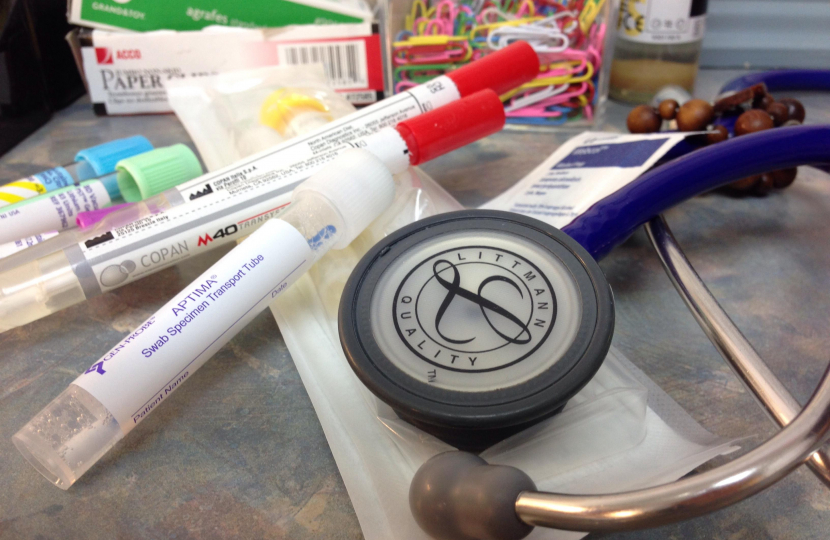
I have agreed to give one minute to Mike Hedges …. To speak at the end of my contribution after my opening speech in this Short Debate.
Nearly 10,000 people are diagnosed with leukaemia in the UK every year, or 27 people every day.
Leukaemia has a significantly higher rate of emergency diagnosis, Accident and Emergency and otherwise, compared to the overall cancer average, 37% to 21% respectively. Being diagnosed via an emergency setting has been linked to reduced survival.
Sadly, there are nearly 5000 deaths attributed to leukaemia every year in the UK with 250 deaths, in Wales every year.
The most recent Public Health Wales Observatory data showed that Betsi Cadwaladr University Health Board was the health board with the highest leukaemia mortality in Wales, with leukaemia being attributable to 311 deaths in the five years between 2017 and 2021.
The challenge with the early diagnosis of leukaemia is multi-faceted, but can be attributed in part to the non-specific symptoms of leukaemia, including persistent fatigue, unexplained bruising, which can also be indicative of more common and less sinister illnesses.
This makes leukaemia hard to spot for both members of the public and healthcare professionals.
A full blood count is all that is needed to diagnose leukaemia early or to rule it out.
This is significantly cheaper than many other diagnostic tests and could also detect many other conditions earlier, helping to save lives.
This is why the Blood Cancer Charity Leukaemia Care has launched its Spot Leukaemia Campaign, in collaboration with Leukaemia research charity, Leukaemia UK, which aims to increase awareness of the signs and symptoms of leukaemia among the public and healthcare professionals, and to help reduce the number of people receiving an emergency diagnosis, which could improve patient outcomes.
The campaign highlights a number of ways to address the challenge of a leukaemia diagnosis.
Leukaemia Care and Leukaemia UK conducted a large patient survey to understand more about patient experience of obtaining the full blood count. They also spoke with their GP advisors.
The campaign was first launched in 2017, with the objective being to raise awareness of the symptoms of leukaemia - and not only of raising awareness of the signs and symptoms of leukaemia, but also seeking to change the public perception of leukaemia and who it affects.
For Example, although the public perception is that Leukaemia is a childhood disease, 64% of people who are diagnosed with a leukaemia are over 65.
Leukaemia Care’s recent YouGov poll found that while 88% of the UK public knew leukaemia was a type of cancer, not everyone could identify the symptoms of leukaemia, with 31% not being able to name a single symptom.
Furthermore, when asked if they would visit their GP if they had any of the symptoms, 28% said they would not because they would not want to put additional pressure on the NHS.
More awareness into leukaemia is greatly needed, with 30% of the UK public still thinking leukaemia only affects those under the age of 15 years of age, and only 4% of the public identifying that leukaemia is more prominent in those who are 65-74 years of age.
Leukaemia can be hard to spot because the signs and symptoms are common to other unrelated illnesses.
Knowing what to look out for could help people make the decision to visit their GP sooner.
The six most common symptoms experienced by all leukaemia patients prior to diagnosis are:
- Fatigue
- Shortness of breath
- Fever or night sweats
- Bruising or bleeding
- Bone/joint pain
- And repeated infections
In addition to symptom awareness, Leukaemia Care has a number of issues they want to highlight to the Welsh Government, including GP capacity pressures.
According to the NICE referral guidelines, everyone presenting with the symptoms of leukaemia should get an urgent 48-hour full blood count to diagnose Leukaemia early or to rule it out.
However, Leukaemia Care and Leukaemia UK’s survey found that only one-third of patients reported that they received a blood test straight away after seeing a GP about their symptoms – i.e. following one appointment only.
In addition, almost a quarter, 23.5%, of acute leukaemia respondents said it took up to three to four months after first presenting to the GP to get a blood test.
Furthermore, Leukaemia Care and Leukaemia UK often hear from their GP advisors that the system and capacity pressures they face stop them from conducting full blood counts every time they see a patient with the symptoms in the NICE guidelines, even though they are aware that they should be.
Leukaemia Care therefore recommends that the Welsh Government should:
- Promote GP education tools that are available on the topic of leukaemia, to help GPs become more familiar with the symptoms of leukaemia.
- And address the GP and other primary care or diagnostic workforce pressures, providing adequate investment for this.
They go on to highlight the importance of utilising other healthcare professionals in the community, who have the correct skill sets, to relieve capacity on GPs.
In Leukaemia Care and Leukaemia UK’s recent survey of leukaemia patients, 39% of patients saw a health care professional who was not a GP about their symptoms at some point prior to diagnosis.
This is possibly due to an inability to get a GP appointment in an appropriate time frame, or due to the patient not realising the severity of symptoms.
There is currently an ongoing trial in England where pharmacists are able to refer patients directly for blood tests when they present to them with symptoms.
This is something that both charities believe should be replicated in Wales.
In their Delivering a Healthier Wales report, the Welsh Pharmaceutical Committee recommend that pharmacists should have the ability to directly refer patients for full blood tests as “this would save GP time and give patients quicker access to results, streamlining the whole process”.
Pharmacists are already increasingly being utilised by the Welsh public. The number of people accessing the Common Ailments Service, where pharmacists can advise patients on common minor ailments during a short consultation, has increased annually since its launch in 2013.
The Spot Leukaemia Campaign therefore recommends that the Welsh Government should ensure that pharmacists:
a) Receive equivalent training on the signs and symptoms of leukaemia.
b) and have the ability to directly refer patients for blood tests.
As previously mentioned, Leukaemia has a significantly higher average emergency diagnosis rate than the overall cancer average.
Unfortunately, Leukaemia cannot be staged like many other cancers.
Proxy measures, such as knowing whether a patient is diagnosed in an emergency setting, including via A&E, which is linked to reduced survival, are crucial to measuring the progress in diagnosing leukaemia earlier.
Emergency presentation data is recorded and published in England, and Scotland are currently in the process of planning to routinely publish cancer diagnosis through emergency presentation data via Public Health Scotland, an action laid out in their 10-year Cancer Strategy.
However, Wales neither routinely records or publishes emergency presentation data, nor routinely collects data enroute to diagnosis, such as via GP, emergency department, or screening for any cancer type, including leukaemia.
Leukaemia Care advises that NHS Wales is working to develop this data, but say that as it will be unvalidated management data used in the management of the suspected cancer pathway, it is not likely to be made publicly available.
The NHS in Wales is already able to track the source of suspicion for suspected cancer referrals, and it is essential that Wales collects and makes more Cancer data available, including emergency presentation data for leukaemia.
Earlier diagnosis is vital to save and improve the lives of those with leukaemia.
The Welsh Government and Public Health Wales should and must, routinely record and publish emergency presentation data for leukaemia, and would be quality of dereliction of duty if they did not respond positively to this urgent call.
One of the ten national design principles in the Welsh Government’s “A Healthier Wales” plan is Prevention and early intervention.
There is therefore little excuse for the Welsh Government not to take up the recommendations made by the Spot Leukaemia Campaign and help stop Leukaemia devastating lives.

